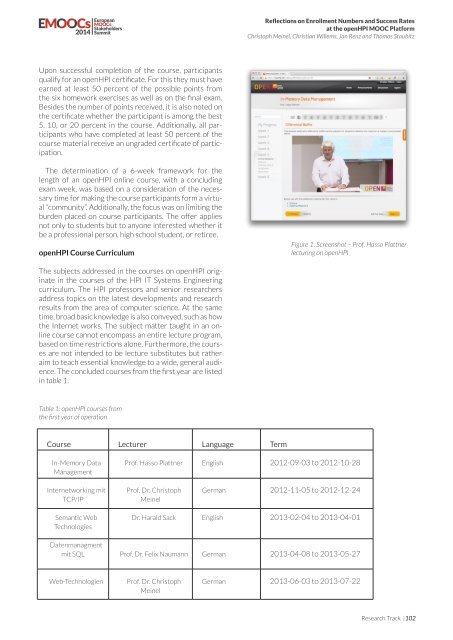zmWmQs
zmWmQs
zmWmQs
You also want an ePaper? Increase the reach of your titles
YUMPU automatically turns print PDFs into web optimized ePapers that Google loves.
Reflections on Enrollment Numbers and Success Rates<br />
at the openHPI MOOC Platform<br />
Christoph Meinel, Christian Willems, Jan Renz and Thomas Staubitz<br />
Upon successful completion of the course, participants<br />
qualify for an openHPI certificate. For this they must have<br />
earned at least 50 percent of the possible points from<br />
the six homework exercises as well as on the final exam.<br />
Besides the number of points received, it is also noted on<br />
the certificate whether the participant is among the best<br />
5, 10, or 20 percent in the course. Additionally, all participants<br />
who have completed at least 50 percent of the<br />
course material receive an ungraded certificate of participation.<br />
The determination of a 6-week framework for the<br />
length of an openHPI online course, with a concluding<br />
exam week, was based on a consideration of the necessary<br />
time for making the course participants form a virtual<br />
“community”. Additionally, the focus was on limiting the<br />
burden placed on course participants. The offer applies<br />
not only to students but to anyone interested whether it<br />
be a professional person, high school student, or retiree.<br />
openHPI Course Curriculum<br />
Figure 1. Screenshot – Prof. Hasso Plattner<br />
lecturing on openHPI<br />
The subjects addressed in the courses on openHPI originate<br />
in the courses of the HPI IT Systems Engineering<br />
curriculum. The HPI professors and senior researchers<br />
address topics on the latest developments and research<br />
results from the area of computer science. At the same<br />
time, broad basic knowledge is also conveyed, such as how<br />
the Internet works. The subject matter taught in an online<br />
course cannot encompass an entire lecture program,<br />
based on time restrictions alone. Furthermore, the courses<br />
are not intended to be lecture substitutes but rather<br />
aim to teach essential knowledge to a wide, general audience.<br />
The concluded courses from the first year are listed<br />
in table 1.<br />
Table 1: openHPI courses from<br />
the first year of operation<br />
Course Lecturer Language Term<br />
In-Memory Data<br />
Management<br />
Prof. Hasso Plattner English 2012-09-03 to 2012-10-28<br />
Internetworking mit<br />
TCP/IP<br />
Prof. Dr. Christoph<br />
Meinel<br />
German 2012-11-05 to 2012-12-24<br />
Semantic Web<br />
Technologies<br />
Dr. Harald Sack English 2013-02-04 to 2013-04-01<br />
Datenmanagment<br />
mit SQL Prof. Dr. Felix Naumann German 2013-04-08 to 2013-05-27<br />
Web-Technologien<br />
Prof. Dr. Christoph<br />
Meinel<br />
German 2013-06-03 to 2013-07-22<br />
Research Track |102


